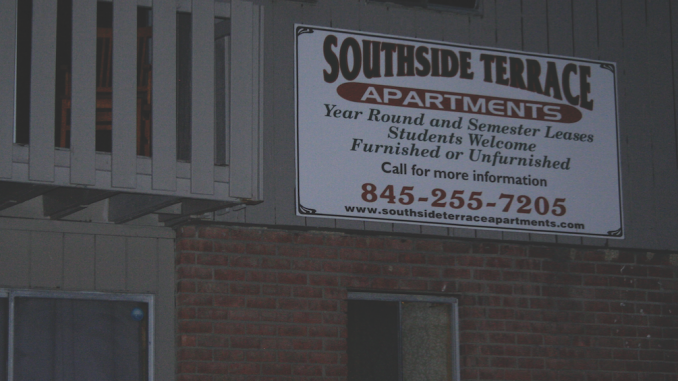
Pro bono attorney at law Celeste Tesoriero, founder of the New Paltz Tenant Union (NPTU) presented at the New Paltz Village Board meeting on Tuesday, Feb. 22 regarding a list of proposed improvements that the union had hoped could be overseen by the board.
At the end of last year, Tesoriero approached New Paltz Village Mayor Tim Rogers in order to express some concerns she has regarding tenant-landlord relations in town.
“The union’s goal is to be there to provide support for tenants as they go through whatever issues arise during their tenancy,” Tesoriero said. “Tenant issues usually fall into one of the following categories: lease break, security deposit, repairs, pets.”
Tesoriero cites a change in legislation as the most probable platform for improving tenant conditions.
“The laws that govern things like lease break, security deposits, etc. — those are local laws. The village board has five members and you need three to pass a law,” Tesoriero said. “We have two supportive members. The third is needed but missing and that’s our biggest struggle.”
Tesoriero voiced her concerns publicly in front of the board for the first time at a village board meeting on Tuesday, Jan. 22.
Prior to this, Rogers expressed that he and the board had encouraged her to compile a presentation and had even connected her to the village’s Tenant-Landlord Relations Council.
Though the council, Rogers explained, does not arbitrate disputes, it is available for all residents in the village and can be used as a resource to educate both tenants and landlords what their rights are under the law.
“We take our law very seriously,” Rogers said. “Every proposal has to be vetted by our committees and then later vetted by our attorney.”
Rogers explained that the village board’s role in housing is primarily safety.
“This is a third party contract between landlords and tenants,” Rogers said. “Government doesn’t play a role other than to ensure safety.”
One of Tesoriero’s initial requests was to have landlords licensed. This condition was not met due to what Rogers explains as the fact that licensing landlords is no different from having them registered — which the village already enforces.
NPTU has expressed an interest in changing the conditions in which a tenant can break their lease, including being able to provide a replacement resident without the say-so of the landlord.
Rogers cited this as a point of contention where housemates might be concerned.
“Landlords vet their residents and if someone is just replaced by the previous resident and not the landlord, this is unfair to possible housemates as well as the landlord,” Rogers said.
Aside from bringing this to the attention of the village board, the union has utilized various platforms in an attempt to bring awareness to the entirety of the community.
“We’ve done a lot of different things to get the word out,” Rogers said. “Posters, flyers, Facebook, you name it. We are about to launch a door-to-door campaign and that will be our biggest outreach to date.”
Tesoriero remains hopeful in the efforts of the union.
“New Paltz is 70 percent rentals, and it has 3,259 tenants to 25 landlords. If I had to close my eyes and dream of a place where there could be the most progressive tenant rights in the country, I’d think of a place like New Paltz,” Tesoriero said. “If it can’t work here, it can’t work anywhere.”
